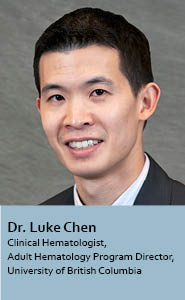Dr. Luke Chen
Title – Academic Half Days in residency: Blurring the boundaries between formal and informal learning

Date: Wednesday, June 17, 2015
Time: 12:00pm to 1:30pm (Lunch will be served at DHCC)
Locations:
- Diamond Health Care Centre 2267
- IRC 305
- MSB 107
- RJH PCC 201C
- KGH CAC 237
- NHSC 9-374
- SHY F414
- Surrey Central City (Manning Room 4109)
Abstract
Resident learning is primarily situated in the clinical workplace, and yet “teaching” or formal education, is often equated with classroom-based activities such Academic Half Days (AHDs). AHDs are nearly ubiquitous in Canadian residency programs, but their role and value have rarely been examined. We explored resident perceptions of the purpose and effectiveness of AHDs in postgraduate training programs at UBC (Family Medicine, Internal Medicine, Hematology, Orthopedics and Obstetrics & Gynecology) and found a number of concepts relevant to the planning and implementation of classroom learning. Engagement in classroom learning occurs through participation in clinically-oriented discussions that highlight expert reasoning processes. Formal classroom teaching, which focuses on knowledge acquisition, can enhance informal learning occurring in the service of clinical activity. The social aspects of AHDs, including their role in creating communities of practice in residency programs and in professional identity formation, are an important and underappreciated asset for residency programs.
Biography
Dr. Luke Chen is a Clinical Hematologist at Vancouver General Hospital and Program Director for Adult Hematology. Luke obtained his M.D. from Dalhousie University, did his Internal Medicine residency at the University of Ottawa and Hematology at UBC. He completed a Clinical Educator Fellowship at CHES, including a Master’s degree in Medical Education (Dundee) in 2010 and joined the Department of Medicine as a Clinical Assistant Professor. He remains an active member of CHES and serves as Lead for the CHES Alumni program. His medical education research focuses on classroom learning and the development of clinical reasoning in postgraduate medical education. Clinical interests include IgG4 related disease, hypereosinophilic syndromes, hemophagocytic syndromes, and iron homeostasis.
Accreditation:
As an organization accredited to sponsor continuing medical education for physicians by the Committee on Accreditation of Continuing Medical Education (CACME), the UBC Division of Continuing Professional Development designates this educational program as meeting the accreditation criteria of the College of Family Physicians of Canada for up to 1.5 Mainpro-M1 credits. This program is an Accredited Group Learning Activity eligible for up to 1.5 Section 1 credits as defined by the Maintenance of Certification program of the Royal College of Physicians and Surgeons of Canada. This program has been reviewed and approved by UBC Division of Continuing Professional Development. Each physician should claim only those credits he/she actually spent in the activity.
